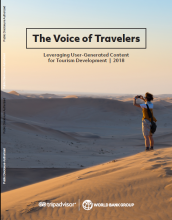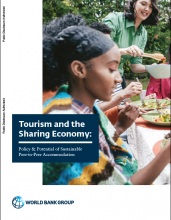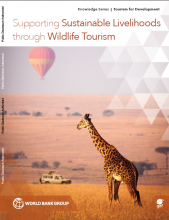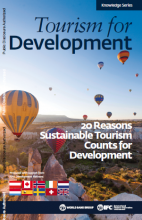The Voice of Travelers
The report explores how businesses and destinations can use UGC to reach potential consumers and drive business and explores the future applications of UGC to monitor business and destination health, improve service levels, and boost overall business performance. It also looks at how UGC can help reduce the barriers for low-income destinations to compete in a global arena and create inclusive business opportunities. The Voice of Travelers explores how UGC could lead to more inclusive outcomes for tourism at a global level. The report is designed as a primer on UGC, not as a comprehensive manual. It is designed to start a dialogue on leveraging UGC for inclusive and sustainable tourism development and to identify areas for future work.
Tourism and Sharing Economy
This report focuses on one disruptive force in the tourism industry: the emergence of peer-to-peer (P2P) accommodation. P2P accommodation occurs when individuals offer, in exchange for money, a room or an entire house for short-term accommodation. The rapid growth of this new product is shaking up the hotel industry and creating a new way to travel and interact with a destination and its community. The objectives of this report are to investigate the opportunities and challenges that P2P provides in developed and emerging destinations and to off er a set of recommendations to better use this new business model for sustainable and inclusive tourism. The report also sketches a research agenda for the near future. This report is written for destination managers, policymakers, and World Bank Group staff involved in the design and management of tourism operations. It is based on desk research, interviews with digital platform managers, and an in-depth study of the case of Jamaica.
Supporting Sustainable Livelihoods through Wildlife Tourism
Tourism is an engine for jobs, exports, and investments. The tourism sector is also the largest, global, market-based contributor to financing protected area systems. Nature-based tourism (NBT) is a sub-component of the tourism sector that includes wildlife-based tourism. NBT is a powerful tool countries can leverage to grow and diversify their economies while protecting their biodiversity and contributing to many sustainable development goals (SDG), including SDGs 12 and 15. Local communities, private sector enterprises, and governments can also benefit from investments in tourism through increased market opportunities and linkages to tourism services such as agriculture production, hoteling, restaurants, transportation, health services, etc. This report explores innovative tourism partnership and investment opportunities to help countries unlock smart investment and grow tourism sustainably. It showcases sustainable wildlife tourism models from Botswana, India, Kenya, South Africa and many other countries and promotes solutions that offer insight into the wildlife-based tourism sector as a mechanism for inclusive poverty reduction and global conservation.
20 Reasons
Sustainable tourism is a proven tool for development, benefitting communities in destinations around the world. As demand for global tourism continues to grow, the opportunities for sustainable development also increase. This report aims to raise awareness of sustainable tourism as a powerful and effective tool for development, leveraging the momentum generated by the United Nations designating 2017 as the International Year of “Sustainable Tourism for Development”. More than 50 years after the World Bank financed its first tourism for development projects in Morocco and Tunisia,1 the case for tourism as a sustainable development model is still a compelling one. Tourism is highly labor intensive, facilitates the development of new infrastructure, helps fund conservation, revitalizes modern and historic cities, and can contribute to international understanding. Despite these benefits, tourism is more often viewed as a luxury for those who can afford it, rather than a nimble development tool. This paper challenges development professionals to embrace the broad, cross-cutting potential of tourism to enhance the lives of those living in existing and emerging destinations.






